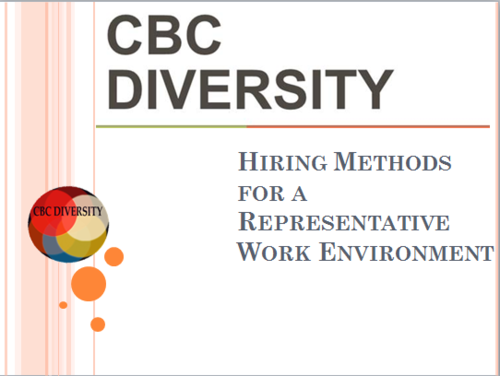CBC Diversity: Hiring Methods for a Representative Work Environment Panel


From the beginning, one of the goals of the CBC Diversity Initiative was to help create a more diverse range of employees working within the industry. Now in its third year, CBC Diversity is taking a closer look at how we can help bring about this change.
In February we attended a highly diverse college fair introducing qualified candidates to the many jobs in publishing. We plan to do more career fairs, virtual and in-person, in the future. This, however, is only one part of the equation.
On March 12, 2014, the CBC Diversity Committee hosted a Lunch & Learn Panel for hiring managers and human resources professionals within children’s book publishing to come together and explore key ideas focusing on how to bring about a more representative industry. The amazing panel was moderated by Andrea Davis Pinkney, Vice President and Executive Editor of Trade at Scholastic, and the panelists included David Bronstein, Cheif Talent Officer at Perseus Books Group; Amy Brundage, Human Resources Director at Hachette Book Group; and Carolynn L. Johnson, Chief Operating Officer at DiversityInc.
The takeaways were fabulous and below you’ll find just a few that were captured.
- The hiring manager is the key—understand their behavior, learn how to communicate with them, and educate them. This will have the best influence on who they hire.
- If you’re in the company, send referrals of candidates that you think would be great to HR. Those usually go to the top of the pile.
- It’s a numbers game. The companies who get it (that diversity is crucial to the bottom line) win, those who don’t go out of business. There is a business case for diversity.
- What makes a good mentee?
- A person who drives the mentorship process and comes to learn and engage
- A person that understands that it’s not all about the mentor giving to them, they should give back to the mentor as well in whatever way they can to add value to the relationship
- A person that understands that there’s a difference between a mentor, a sponsor, and a coach. Asking one person to be all of those things won’t work because they have different responsibilities and needs. It’s important for a mentee to always be networking so they have access to many advocates.
- Training is so important for hiring managers because it shows them that they may have unknown biases and then will help decrease those biases in the future.
- A way to infuse diversity training into the company is to do it within higher management training.
- Include two-way interaction with scenarios
- Try to provide a training session where the manager feels like they’ve solved 3-4 problems in the session (presumably through those scenarios)
- Companies have to do the work if they care about creating and promoting their diversity.
- Is it in the job posting description of the company? Where are you posting the job—just within industry-specific websites or only on the company website?
- Is there diversity on the company website?
- Where and how are your corporate values communicated and where does diversity fit in?
- Hiring managers need to go to where the people are—to the communities, individuals, institutions that have the diversity that you crave. They aren’t going to come to you—especially if the above bullet isn’t handled.
- Numbers are important. Ask managers to pay attention to those numbers because when you shine a light on something, there is change.

